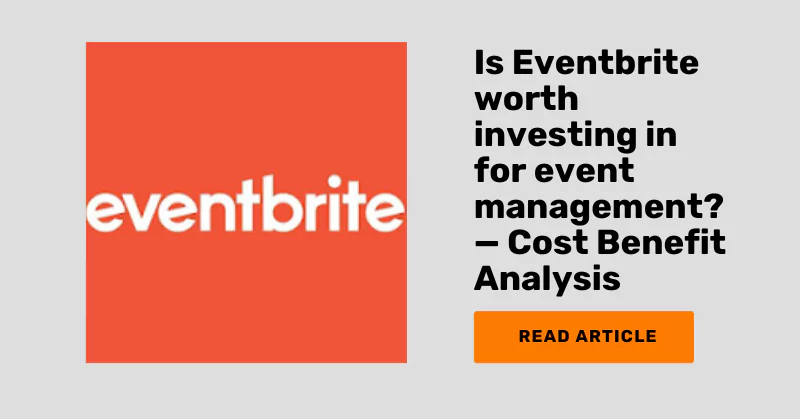Do you ever wonder what goes into making corporate event budgets.
You look at those amazing corporate gatherings. Everyone is talking about them. You too want to organize events like these.
From product launches to team-building shindigs, each event has its own flavor and purpose.
But here’s the secret sauce that ties them all together—the budget!
Let’s dive into the world of corporate events and demystify the art of financial planning.
A. What is a corporate event example?
Corporate events are events organized by and for businesses and companies to achieve their goals.
Examples of corporate events include:
- Product launch events
- Board meetings
- Team-building events
- Training
- Corporate parties
- Trade shows
- Networking events
- Company award ceremonies
- Charity events
- Community engagement events
To get a full list of all corporate events and how to organize them, refer to our master guide for planning corporate events.
Corporate events are organized for a variety of reasons. Examples of the reasons can be to promote product and sales, foster better relationships, and boost corporate morale.
Different types of corporate events have different purposes but they all have one thing in common—the budget.
So, let’s delve deeper into understanding how corporate event budgets work. In this article, you’ll also learn how they work.
B. What is a corporate event budget?
A corporate event budget is a financial plan that helps you allocate resources effectively to organize your event.
Ideally, it should outline all revenue streams, fixed costs, variable costs, and anticipated costs.

A good practice is also to include contingency funds in your corporate event budget.
An event budget should be backed by advanced analytics, strategic foresight, and commitment.
A good corporate event budget is also one that can adapt to the different challenges event planning brings.
You’ll learn the best practices and inclusions of a corporate event budget shortly. Read till the end to also learn how you can manage the budget.
C. How do you calculate the corporate event budget?
Calculating office event budgets requires a lot of strategic planning. It aims at optimal resource allocation.
Your first step would be to estimate expenses. The expenses will be spread across a variety of event requirements like venue, catering, entertainment, technology, and marketing.
We will get into the details of budget elements later on. But, let’s cover the more important tenets of budget planning first.
After estimating expenses, you’ll need to categorize them. Distinguish between fixed and variable costs so that your budget is precise. For example, fixed costs would be the venue and entertainment. The price you pay for this will not change later. Variable costs can include catering and per-person-based quotations.
To be able to calculate where you stand in terms of profit, you also need to know all revenue sources. Your fixed revenue will come from sponsors and booth rentals. Variable revenue is mostly generated from the ticket and product sales per person.
You should use online forecasting and tracking tools to monitor your variable revenue. This will help guide your purchase decisions leading up to the event.
You must also keep a contingency fund aside for any unexpected challenges or circumstances. To get the precise amount of how much contingency fund you need, read till the end.
Lastly, you need to keep your return on investment (ROI) in mind. By subtracting revenue from the expenses, you should get a good idea about your ROI.
D. How can I improve my budget planning skills?
A good budget planner is finally accountable. You should be tracking expenditures very closely.
With an adaptable budget, you should also be able to redirect and reduce expenses. Events are volatile in nature, thus you need to be adaptable and calm to stay under budget.
You should also use technological tools and AI for budget tracking and management. It reduces the margin for error and leaves you with time to focus on other things.
To learn more about event budgets and related tools, read our event budgeting guide.

At the end of each event, make it a habit to do an in-depth analysis. Write down the good practices learned and errors to avoid in the future.
E. What does a corporate event budget usually include?
So far, we have discussed the parts of your event budget. Now, let’s get into the details.
Your revenue sources will include:
- Registration fees: This will be generated on a per-person/per-group basis
- Sponsorship revenue: Companies will provide you with funds in exchange for promotion
- Exhibitor fees: If you have stalls and booths at your event, people will pay you to set up their stall
- Other income sources specific to your event
You will have two main types of expenses—fixed and variable.
Fixed costs will include:
- Venue costs consisting of rental fees, insurance, and permits
- Technology consisting of all audiovisual equipment that may be rented/bought and WiFi charges
- Entertainment costs that will include payment to the artist/speaker, their accommodation, and staging
- Event staff salaries for coordination, cleaning, and event security
- Event decor including signage, event branding, and aesthetic elements
- Photography and videography
- Technological costs
- Marketing costs for both print media and digital marketing
- You can allocate a fixed amount for these budget elements.
Your variable event planning costs include:
- Food and beverage cost per attendee
- Transportation costs for equipment, furniture, and even attendees in some cases
- Miscellaneous costs specific to your event
F. How can I calculate the financial health of my event?
You can calculate the financial health of your event at any point by using this formula:
Net cash flow = cash inflow – cash outflow
Here, cash inflow includes the total income from all revenue sources. Cash outflow includes total expenses excluding the contingency fund.
A positive and higher number will ensure that your event budget is effective.
G. What is a corporate event package?
A corporate event package is a proposal tailored to a particular business and its event idea. It’s an event-planning service that provides companies with a cost-effective solution.
It includes all services like venue rental, catering, audiovisual equipment, event staff, decoration, and transportation.
By offering such packages, you can excel as a corporate event planner. Keep your event packages customizable based on scale, theme, and event goals.
H. FAQ
1. What percentage of the corporate event budget should be allocated to contingency funds for unexpected expenses?
Depending on the scale and risk factors in an event, the contingency amounts should be between 5-20% of your budget.
The percentage selected shouldn’t just be based on what you can afford. You should instead prioritize factors like the complexity and uncertainties of the event.
For large-scale corporate events like product launches, you can choose the higher end of the contingency.
Similarly, for smaller team-building events within the company, you can choose the lower end of the range.
Well-assessed and thought-out contingency plans will ensure event success without compromises.
Additionally, if this amount doesn’t get used, it adds to the profit and budget of the next event.
2. How can I make my corporate events more secure?
Most corporate events are exclusive. However, choosing venues outside a secure workplace can often pose risk factors.
Therefore, these events should be strictly RSVP-based. You can use trusted tools like Ticket Generator to automate the process of creating and sending tickets.
It comes with a scanner app that can help you authorize entries at the venue.
To top it all up, you can gather all attendee insights from this event planning tool. This will help you plan and market events better.
3. How can I estimate the number of attendees to calculate variable costs accurately?
Event planners are hopeful people, but they also need to be practical.
You won’t know but how many people will show up at the event until the day of the event.
But then, how are you supposed to book the venue and hire catering? They’re largely dependent upon the number of people that will show up.

Thus, before you make all bookings, you need to promote RSVPs. Another way to get a realistic idea of the expected attendance is to analyze historical data.
You can gather data based on the industry, event type, and past events. Surveying can also help.
H. Conclusion
Navigating the realm of corporate event budgets isn’t rocket science, but it sure helps to have a game plan. We’ve covered everything from estimating expenses to calculating net cash flow.
Remember, adaptability and a dash of accountability are your secret weapons.
So, whether you’re a seasoned event pro or just dipping your toes into the planning pool, keep learning and stay flexible.
Technology is your friend—use it wisely.
Whether you’re orchestrating a product launch extravaganza or a casual team-building fiesta, these budgeting tips will keep your financial ship sailing smoothly.
But hey, event planning isn’t just about crunching numbers; it’s a journey of growth and adaptation.
So, as you venture into the world of budgeting, embrace the unexpected and dance with the uncertainties.
Your ability to stay cool and adaptable is your secret weapon in this dynamic game.
As you bid adieu to each event, jot down the wins and the losses for next time.
Hungry for more event wisdom? Join our LinkedIn community for bite-sized information about the event industry.






